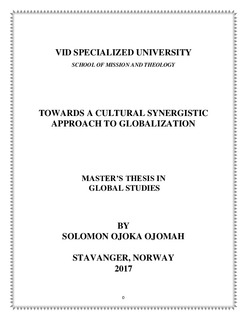| dc.description.abstract | The transnational flow of people in different works of life may not be regarded as something new. Even so, it has resulted in the inevitable coming closer together of the world which has led to the description of the world as a ‘global village.’ This portrayal catalyzes the term globalization with several activities that poses the question of whose culture reigns in the global village, giving the fact that each nation has its own culture prior to the intensified transnational flow. Some scholars are of the view that it is the Western culture, thereby regarding globalization as being tantamount to homogenization of different cultures of the world in favour of Western or American culture as the standard of judging other cultures. The ascription of Western culture as the operating culture of globalization signals an aspect of globalization that is the crux of globalization discussion; the cultural globalization. Hence, three dimension of cultural globalization are identified; the homogenization dimension which is based on dominance, the hybridization dimension that focuses on mixture of cultures, and the polarization that entails antagonism between different cultures in reaction to the dominant culture of the globe. Once these three dimension of cultural globalization are subjected to the ideals of intercultural competence, it would be glaring that there are several cultural drawbacks associated with the key players of globalization. As a way of supplementing for the lack of intercultural competence accompanying globalization, intercultural dialogue that would enhance cultural synergy is presented as the antidote to the weaknesses inherent in the inevitable globalized world. In all, analytical method would be applied in understanding globalization, also hermeneutical method would also be utilized because a proper interpretation of others cultures breeds an understanding that would yield cultural synergy; a rational approach to globalization that creates equal ground for all cultures. | nb_NO |
